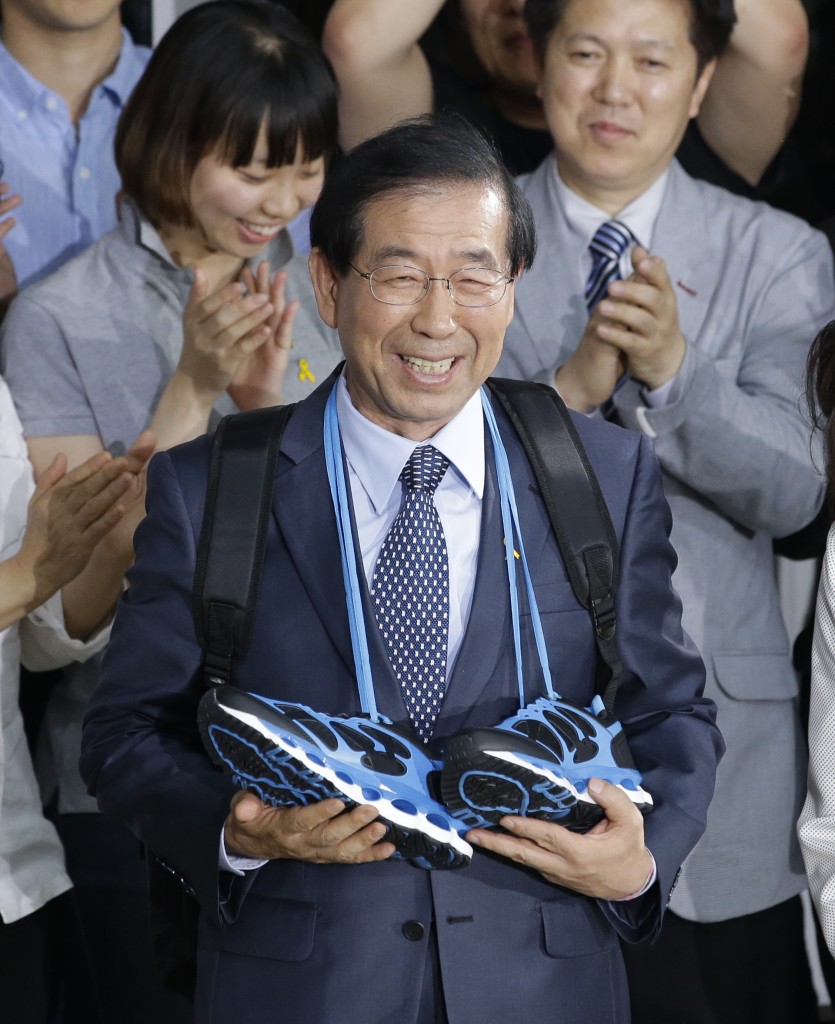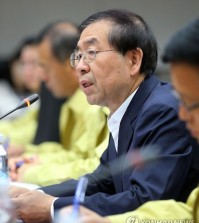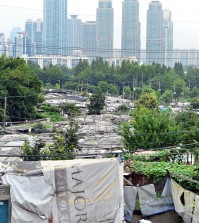- California Assembly OKs highest minimum wage in nation
- S. Korea unveils first graphic cigarette warnings
- US joins with South Korea, Japan in bid to deter North Korea
- LPGA golfer Chun In-gee finally back in action
- S. Korea won’t be top seed in final World Cup qualification round
- US men’s soccer misses 2nd straight Olympics
- US back on track in qualifying with 4-0 win over Guatemala
- High-intensity workout injuries spawn cottage industry
- CDC expands range of Zika mosquitoes into parts of Northeast
- Who knew? ‘The Walking Dead’ is helping families connect
Seoul Mayor Park Won-soon re-elected

Park Won-soon, candidate for Seoul city mayor of the main opposition party New Politics Alliance for Democracy celebrates his victory in the Seoul mayoral election at his office in Seoul, South Korea, Thursday, June 5, 2014. President Park Geun-hye’s conservative ruling party and its liberal rival appeared set to split key races in local elections Wednesday that are seen as a measure of how the public feels about her government’s handling of April’s deadly ferry disaster. (AP Photo/Lee Jin-man)
By Kang Seung-woo
Park Won-soon recaptured the mayoral post of Seoul, despite a tough challenge from Chung Mong-joon of the ruling Saenuri Party.
Chung, a former seven-term lawmaker and FIFA vice president, employed a negative campaign in the run up to the election.
This time, the victory has more significance for Park than when he first captured the post in a 2011 by-election in that the 58-year-old got it based on his achievements during his two-and-half-year tenure as mayor and won the race for himself.
In 2011, the Seoul mayor’s post was vacant for more than two months after conservative Oh Se-hoon quit shortly after failing to block an opposition-led free school lunch program in the city’s first-ever referendum. Ahn Cheol-soo, the IT prodigy-turned-politician, emerged as a top contender to fill the position.
However, despite his unmatched popularity, Ahn decided not to run for Seoul mayor and backed Park, which helped Park defeat Na Kyung-won, a judge-turned-politician of the governing Grand National Party (GNP) by taking the majority of the votes. The GNP is the forerunner of the Saenuri Party.
Park beat Chung by a large margin, but the number does not indicate the bumpy road Park faced en route to his second term.
During the election campaign, Chung and his party attacked Park on the issue of school meals provided during his term in office.
Chung argued that the Board of Audit and Inspection earlier produced a report showing agricultural chemicals were detected in ingredients for the meals.
In addition, Chung, the de facto owner of Hyundai Heavy Industries, suggested that Park’s wife, Kang Nan-hee, may be abroad and living a “cozy life” instead of supporting her husband, who claims to represent low-income families ― although Park said such speculation was false.
Assured of four more years in office, Park, a native of Changnyeong, South Gyeongsang Province, is poised to place top priority on the lives and safety of citizens in the wake of the April 16 Sewol ferry sinking that left more than 300 people dead or missing. The accident was caused by the nation’s deep-rooted insensitivity to safety.
“I will pursue a Seoul where people are safe; a Seoul where people are warm-hearted; a Seoul where people dream and create; a Seoul where people and the city breathe together; and a Seoul that is upright and dignified,” he said at a press conference to announce his bid for re-election on May 15.
“The new Seoul should place top priority on people, lives and safety, and uphold basics and principles.”
For example, he said that the city government will replace old subway cars with new ones equipped with more safety features by 2022 with a budget of 877 billion won ($856 million).
Thanks to his re-election, Park has also established himself as a competitive candidate for the 2017 presidential election because the post is seen as a strong springboard to the presidency ― despite downplaying the speculation.
Former President Lee Myung-bak served as Seoul mayor from 2002 to 2006 before his presidency and Oh Se-hoon was also regarded as a strong candidate before quitting.














